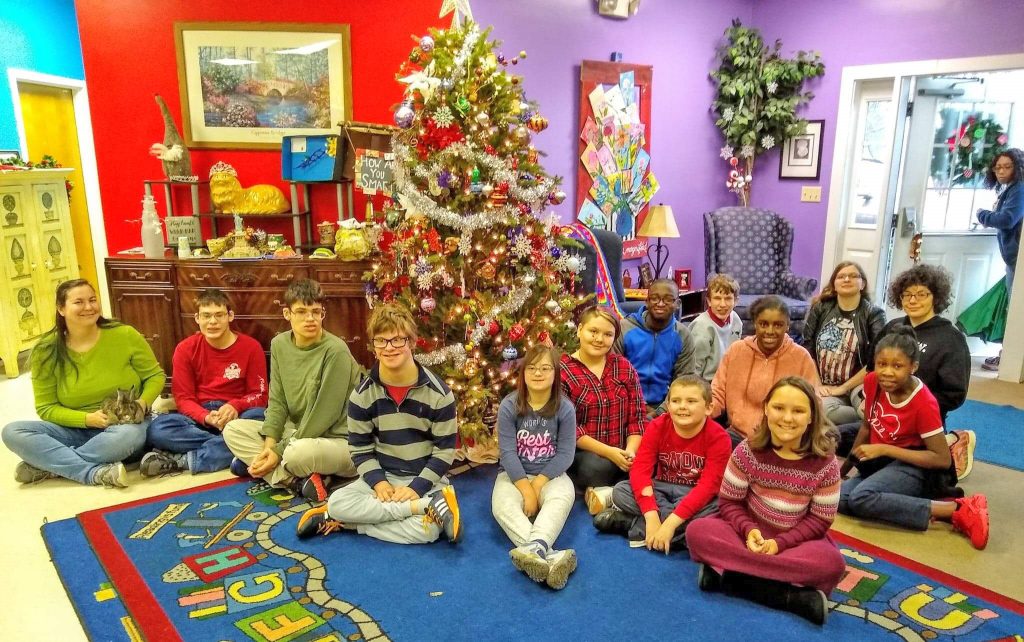School Must Raise $50K by Dec. 25 to Stay Open

RIDGEWAY – After an IRS rule change impacted a major nonprofit funding source, a special needs school in Ridgeway is hoping for a Christmas miracle to help keep its doors open in 2020.
The Barclay School, which currently serves 16 special needs children, has become a valued part of the community in the last few years as it has grown, says Gillian Barclay-Smith, head and founder of the school.
Begun more than a decade ago in a house on the campus of Columbia College, it moved five years ago to Ridgeway, a town of about 300, which she says has welcomed the children with open arms.
“We work with all children who learn differently. So, some of our children are on the autism spectrum, we have children with Down [Syndrome], we have children who struggle with reading and writing, we have children who struggle with anxiety. We are a hodgepodge of diversity and glad to be so,” says Barclay-Smith.
“It sounds really trite, but we really are a family; the feel here is different. We meet the children where they are and not where the calendar says that they probably should be.”
The school’s funding uncertainty going into the new year has a lot to do with a change to IRS rules for tax deductions disbursed through programs like South Carolina’s Exceptional SC, the nonprofit charged with distributing funds donated by taxpayers through an education-focused tax credit program.
The organization currently helps to fund 142 special needs schools across the state, with funding distributed through a formula based on enrollment. At the Barclay School, this funding supplements the revenue generated by tuition that’s charged on a sliding scale.
“I love this program because it redirects tax dollars to do something government is not very good at – these kids. It’s not that they can’t learn; they just learn differently,” says Chad Connelly, executive director of Exceptional SC.
“Once you get a program in place like ours [for] five or six years, they come to count on it – and when something like this happens, what the heck do you do? It puts everybody in a bad fix.”
The IRS rule change, he says, capped the amount an individual donors can claim a federal tax deduction for at $10,000. So while donors still receive a dollar-for-dollar match in state tax credits at a higher amount, the limit on federal deductions discourages larger contributions.
The limit does not apply to corporate donors, but corporate taxes are low in South Carolina, he says – so limiting individual donors has cost the program big time. Last year, Exceptional SC raised $17.5 million in a day and a half; this year it raised just $6 million – and that took six months.
Barclay-Smith says that for a small school like hers, funding received through the program is a big deal. Now, she says, they need to raise $150,000 to get through the end of the school year – $50,000 of that is needed by Dec. 25 to stay open – which will also buy time to put together a new funding plan for the future.
The community response so far has given her hope in this tiny town, whose iconic main street is fit for a Hallmark movie.
When the school’s landlord MEKRA Lang North America – a major industrial employer in Ridgeway – heard what had happened, they offered a valuable Christmas gift – free rent in 2020.
Small donations have started to trickle in from the community: a $300 check from a town community fund, a local tea shop’s pledge to host a fundraiser, smaller donations from individuals giving what they can. It’s a good start – but it’s still a big hole to fill.
“People tell me Ridgeway is Mayberry. It’s an amazing little place. And if we could run on kindness, we wouldn’t have a problem,” she says.
But it takes more than love from the community to cover bills and payrolls taxes. It takes dollars. And while they’ve set up a donation page (savebarclay.com) and parents are mobilizing to help raise funds, it’s a big task. They’re hoping more people will join in the effort.
For Barclay-Smith, who herself struggled with learning issues as a child, education is a lifelong passion. The Barclay School began 11 years ago with a handful of parents who asked Barclay to work with their children using her holistic teaching methods.
Her own story is an interesting one. After failing a high-stakes test as a middle-school student in her native England, she was sent to a school for low-performing students. But that school taught differently, and the next time testing came around, she went from failure to prodigy overnight.
“I knew that I hadn’t changed,” she says. “The only thing that had changed was the approach in how I was taught.”
She went on to earn a master’s degree in Germany and a Ph.D. in education from the University of South Carolina. At the Barclay School, she says, the teachers understand their students because they too have struggled with issues like dyslexia and ADHD.
In addition to the school’s five full-time and two part-time teachers, they also rely upon two employees provided by Goodwill, two volunteer art teachers, help from college students studying to become teachers, and countless community groups that help with everything from lessons on gardening to talks on practical life-skills topics to weekly trips to the library.
Barclay-Smith describes the school as a community where the children celebrate each other’s victories, where there’s no homework or “drill and grill” instruction, where chores and social graces are taught along with academics. There’s a farm-like collection of class pets, and the calendar is broken up with frequent field trips and downtown shopping excursions.
Another important aspect of their learning is community service. The children participate by helping with Meals on Wheels, making cards, decorating downtown, and anything else that they can do to learn how to give back.
“We’re a very different kind of school. We focus very much on what’s called strength-based learning, which basically flips the paradigm upside-down. Instead of focusing on everything we can’t do,” Barclay-Smith says, “we’re way more interested in what you can do. Where’s your passion? Where’s your love? For a lot of our children it’s music, it’s the arts, it’s drama. We try to find the children’s strengths, and it’s truly metamorphosing when they come here.”
In the end, successful education is not about money, Barclay says. It’s about mindset. As a small, independent school, they’ve always operated on a shoestring budget. Still, it takes something.
“Pretty much every desk, every chair, every book in this building was given to us or we went through Goodwill or we dug it out,” she says. “We’ve got this far on string, so let’s see if we can keep going.”
To make a donation, go to savebarclay.com or call 803-629-6318.










